What is Individual Therapy?
Individual therapy, or individual counseling, is an opportunity to receive support and experience growth during challenging times in life. Individual counseling can help you deal with anger, depression, anxiety, substance abuse, marriage and relationship challenges, parenting problems, school difficulties, career changes, etc.

Individual counseling (sometimes called psychotherapy or talk therapy) is a process through which clients work one-on-one with a mental health professional in a safe, confidential environment. Counseling allows individuals to explore their feelings, beliefs, and behaviors, work through challenging or influential memories, identify aspects of their lives that they would like to change, better understand themselves and others, set personal goals, and work toward desired change.
Individual therapy is counseling focused on the individual’s immediate or near future concerns. Individual counseling may encompass career counseling and planning, grief after a loved one dies, or working through issues at work before they become big. Individual counseling is supported by the one-on-one relationship, or bond, between the counselor and client that enables trust and personal growth.


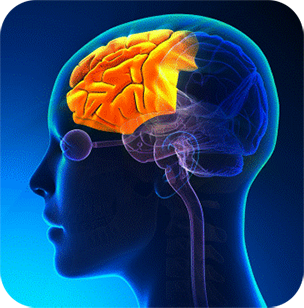



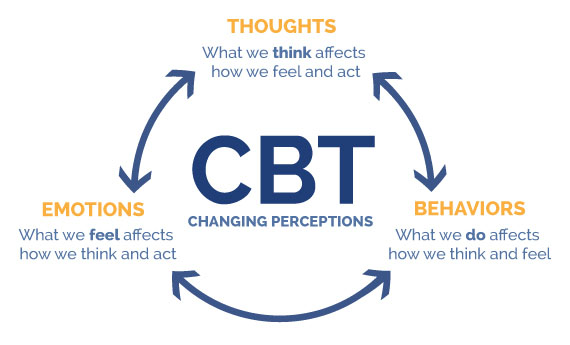 Cognitive behavioral therapy (CBT) is a form of psychological treatment that has been demonstrated to be effective for a range of problems including depression, anxiety, alcohol and drug use problems, marital problems, eating disorders, trauma, and severe mental illness.
Cognitive behavioral therapy (CBT) is a form of psychological treatment that has been demonstrated to be effective for a range of problems including depression, anxiety, alcohol and drug use problems, marital problems, eating disorders, trauma, and severe mental illness.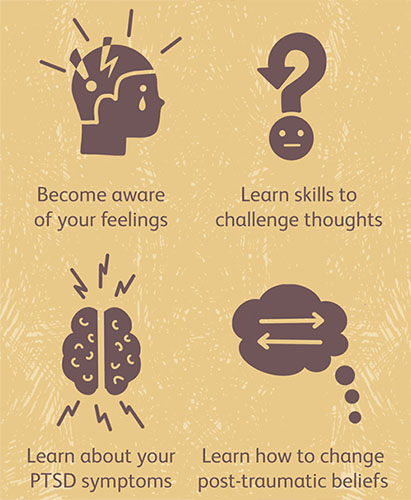 Cognitive processing therapy (CPT) is a specific type of cognitive behavioral therapy that helps patients learn how to modify and challenge unhelpful beliefs related to the trauma.
Cognitive processing therapy (CPT) is a specific type of cognitive behavioral therapy that helps patients learn how to modify and challenge unhelpful beliefs related to the trauma. Cognitive-behavioral conjoint therapy for PTSD (CBCT for PTSD) is designed to improve post-traumatic stress symptoms and enhance intimate relationships when one or both partners suffer from PTSD.
Cognitive-behavioral conjoint therapy for PTSD (CBCT for PTSD) is designed to improve post-traumatic stress symptoms and enhance intimate relationships when one or both partners suffer from PTSD.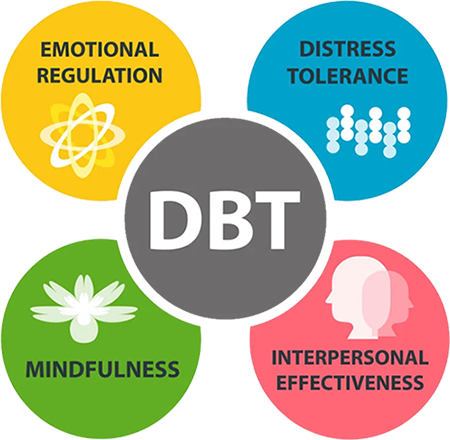 Dialectical behavior therapy (DBT) is a type of talk therapy based on cognitive behavioral therapy (CBT). It is specially adapted for people who feel emotions very intensely.
Dialectical behavior therapy (DBT) is a type of talk therapy based on cognitive behavioral therapy (CBT). It is specially adapted for people who feel emotions very intensely.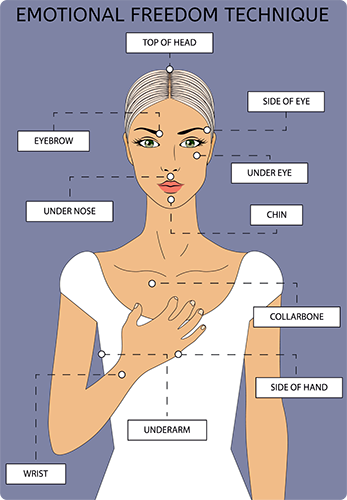 Emotional freedom technique (EFT) tapping is a mind-body method of tapping acupuncture points (acupoints) on the hands, face, and body with your fingertips while focusing on an issue or feeling you’re hoping to resolve. This method may reduce stress and anxiety, improve performance, lessen cravings, and help resolve fears.
Emotional freedom technique (EFT) tapping is a mind-body method of tapping acupuncture points (acupoints) on the hands, face, and body with your fingertips while focusing on an issue or feeling you’re hoping to resolve. This method may reduce stress and anxiety, improve performance, lessen cravings, and help resolve fears. Existential psychotherapy is a style of therapy that places emphasis on the human condition as a whole. Existential psychotherapy uses a positive approach that applauds human capacities and aspirations while simultaneously acknowledging human limitations.
Existential psychotherapy is a style of therapy that places emphasis on the human condition as a whole. Existential psychotherapy uses a positive approach that applauds human capacities and aspirations while simultaneously acknowledging human limitations.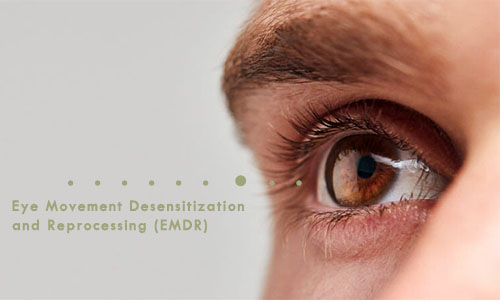 Eye Movement Desensitization and Reprocessing (EMDR), as with most therapy approaches, focuses on the individual’s present concerns. The EMDR approach believes past emotionally-charged experiences are overly influencing your present emotions, sensations, and thoughts about yourself. As an example: “Do you ever feel worthless although you know you are a worthwhile person?”
Eye Movement Desensitization and Reprocessing (EMDR), as with most therapy approaches, focuses on the individual’s present concerns. The EMDR approach believes past emotionally-charged experiences are overly influencing your present emotions, sensations, and thoughts about yourself. As an example: “Do you ever feel worthless although you know you are a worthwhile person?” Insight oriented therapy approaches mental health counseling with a specific focus on helping you understand your inner motivations and workings. Your therapist will use insight oriented therapy to encourage you to analyze and further understand how events of your past are negatively influencing your current thoughts, feelings, and unconscious behaviors.
Insight oriented therapy approaches mental health counseling with a specific focus on helping you understand your inner motivations and workings. Your therapist will use insight oriented therapy to encourage you to analyze and further understand how events of your past are negatively influencing your current thoughts, feelings, and unconscious behaviors. Integrative behavioral couple therapy (IBCT) is a relatively new approach to couple therapy. Integrative Behavioral Couple Therapy is “integrative” in at least two senses: First, it integrates the twin goals of acceptance and change as positive outcomes for couples in therapy. Couples who succeed in therapy usually make some concrete changes to accommodate the needs of the other but they also show greater emotional acceptance of the other. Second, IBCT integrates a variety of treatment strategies under a consistent behavioral theoretical framework.
Integrative behavioral couple therapy (IBCT) is a relatively new approach to couple therapy. Integrative Behavioral Couple Therapy is “integrative” in at least two senses: First, it integrates the twin goals of acceptance and change as positive outcomes for couples in therapy. Couples who succeed in therapy usually make some concrete changes to accommodate the needs of the other but they also show greater emotional acceptance of the other. Second, IBCT integrates a variety of treatment strategies under a consistent behavioral theoretical framework.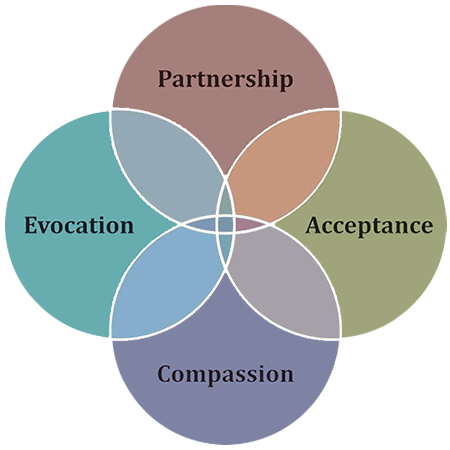 Motivational interviewing is a therapeutic method that helps clients resolve ambivalent feelings and insecurities to find the internal motivation people need to change their behavior. It is a practical, empathetic, and short-term process that takes into consideration how difficult it is to make life changes.
Motivational interviewing is a therapeutic method that helps clients resolve ambivalent feelings and insecurities to find the internal motivation people need to change their behavior. It is a practical, empathetic, and short-term process that takes into consideration how difficult it is to make life changes.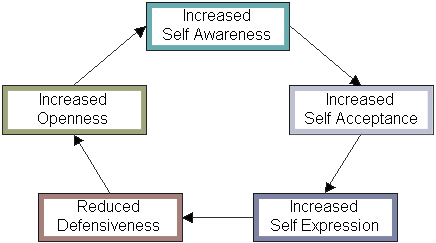 Person-centered therapy operates on the humanistic belief that the client is inherently driven toward and has the capacity for growth and self-actualization; it relies on this force for therapeutic change. The role of the therapist is to provide a nonjudgmental environment conducive to honest self-exploration.
Person-centered therapy operates on the humanistic belief that the client is inherently driven toward and has the capacity for growth and self-actualization; it relies on this force for therapeutic change. The role of the therapist is to provide a nonjudgmental environment conducive to honest self-exploration. Play Therapy is an evidence-based practice for working with children in mental health.
Play Therapy is an evidence-based practice for working with children in mental health.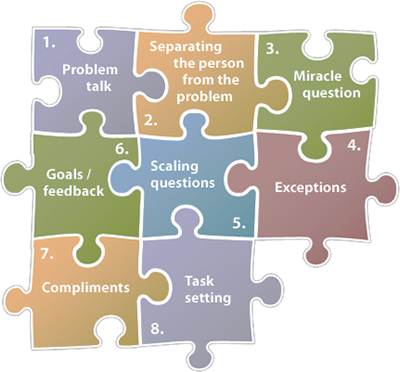 Solution-Focused Brief Therapy (SFBT), also called Solution-Focused Therapy (SFT), is a short-term, goal-focused, evidence-based therapeutic approach that incorporates positive psychology principles and practices to help clients change by constructing solutions rather than focusing on problems. In the most basic sense, SFBT is a hope friendly, positive emotion eliciting, future-oriented vehicle for formulating, motivating, achieving, and sustaining desired behavioral change.
Solution-Focused Brief Therapy (SFBT), also called Solution-Focused Therapy (SFT), is a short-term, goal-focused, evidence-based therapeutic approach that incorporates positive psychology principles and practices to help clients change by constructing solutions rather than focusing on problems. In the most basic sense, SFBT is a hope friendly, positive emotion eliciting, future-oriented vehicle for formulating, motivating, achieving, and sustaining desired behavioral change.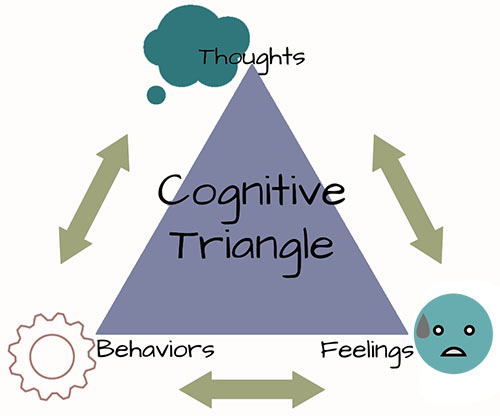 Trauma-focused cognitive behavioral therapy (TF-CBT) is an evidence-based treatment for children and adolescents impacted by trauma and their parents or caregivers. Research shows that TF-CBT successfully resolves a broad array of emotional and behavioral difficulties associated with single, multiple and complex trauma experiences.
Trauma-focused cognitive behavioral therapy (TF-CBT) is an evidence-based treatment for children and adolescents impacted by trauma and their parents or caregivers. Research shows that TF-CBT successfully resolves a broad array of emotional and behavioral difficulties associated with single, multiple and complex trauma experiences.